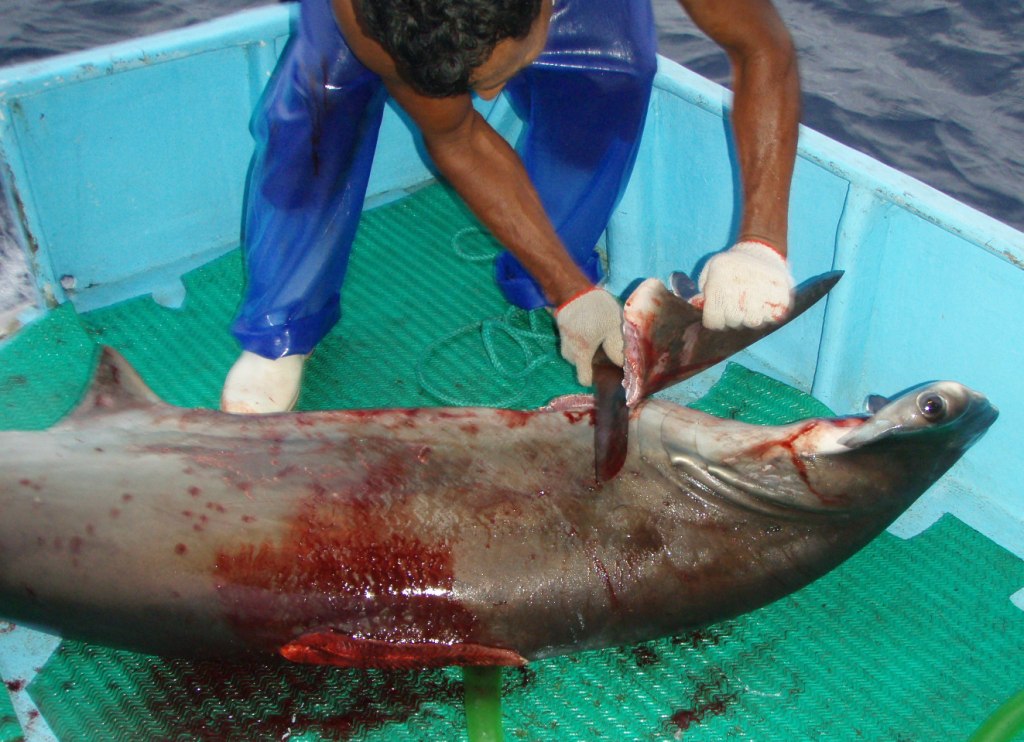Shark Finning Legislation
A PATCHWORK OF PROTECTIONS AT BEST.
Each country with a coastline is responsible for laws and regulations pertaining to fishing in their waters. A number of countries have anti-shark-finning legislation. But even then, many only stipulate that fins must arrive in a 5 per cent ratio of the shark carcasses onboard, and only a few countries demand that sharks arrive in port with fins attached. According to the IUCN Shark Specialist Group, the easiest way to implement a ban is to require that shark carcasses be brought into port with fins attached; the possession of fins alone would be illegal. (Shark meat is considered of low value, due in part to its high content of methylmercury, and as a result is not worth the cost of transporting bulky shark bodies to market.)
Shark finning violates the United Nations Food and Agriculture Organization’s Code of Conduct for Responsible Fisheries, and the practice is contrary to the Organization's International Plan for the Conservation and Management of Sharks.
This year at the CITES Convention of the Parties (CoP) we anticipate the proposals listing shortfin and longfin mako sharks on CITES Appendices will be hard fights and we have been working behind the scenes gathering support for these and other marine species under consideration; including six species of giant guitarfish and 10 species of white-spotted wedgefish. We also will be working to prevent the removal of existing protections for other threatened and endangered species.
In the United States there is an active piece of legislation, H.R.737 - Shark Fin Sales Elimination Act of 2019. If enacted into law it will be illegal to buy or sell shark fins in the United States, and further crack down on shark finning. Finning is already illegal in U.S. waters, but eliminating the trade of fins would cut down on finning elsewhere and squash the market in the U.S. Click HERE to see where your senators and representatives stand on this important act, and please speak out if they are not representing your views.
Countries
Without Bans
Afghanistan, Albania, Algeria, Andorra, Angola, Antigua and Barbuda, Armenia, Austria, Azerbaijan
The Bahamas, Bahrain, Bangladesh, Barbados, Belarus, Belgium, Belize, Benin, Bhutan, Bolivia, Bosnia and Herzegovina, Botswana, Brunei, Bulgaria, Burkina Faso, Burundi
Cabo Verde, Cambodia, Cameroon, Central African Republic, Chad, China, Comoros, Congo (Democratic Republic of), Côte d’Ivoire, Croatia, Cuba, Cyprus, Czech Republic
Denmark, Djibouti, Dominica, Dominican Republic
East Timor (Timor-Leste), Ecuador, Egypt, Equatorial Guinea, Eritrea, Estonia, Ethiopia
Fiji, Finland, France
Gabon, Georgia, Germany, Ghana, Greece, Grenada, Guatemala, Guinea-Bissau, Guyana
Haiti, Hungary
Iceland, Indonesia, Iran, Iraq, Ireland, Israel, Italy
Jamaica, Japan, Jordan
Kazakhstan, Kenya, Kiribati, Korea (North), Korea (South), Kosovo, Kuwait, Kyrgyzstan
Laos, Latvia, Lebanon, Lesotho, Liberia, Libya, Liechtenstein, Lithuania, Luxembourg
Macedonia, Madagascar, Malawi, Malaysia, Maldives, Mali, Marshall Islands, Mauritania, Mauritius, Mexico, Micronesia (Federated States of), Moldova, Monaco, Mongolia, Montenegro, Morocco, Mozambique, Myanmar (Burma)
Nauru, Nepal, Netherlands, Niger, Nigeria, Norway
Pakistan, Palau, Papua New Guinea, Paraguay, Peru, Philippines, Poland, Portugal
Qatar
Romania, Russia, Rwanda
Saint Kitts and Nevis, Saint Lucia, Saint Vincent and the Grenadines, Samoa, San Marino, Sao Tome and Principe, Saudi Arabia, Senegal, Serbia, Singapore, Slovakia, Slovenia, Solomon Islands, Somalia, Sri Lanka, Sudan, South Sudan, Suriname, Swaziland, Sweden, Switzerland, Syria
Tajikistan, Tanzania, Thailand, Togo, Tonga, Trinidad and Tobago, Tunisia, Turkey, Turkmenistan, Tuvalu
Uganda, Ukraine, United States (39 states), Uruguay, Uzbekistan
Vanuatu, Vatican City, Vietnam
Yemen
Zambia, Zimbabwe
U.S. States
Without Bans
Only 12 states have placed bans on the shark fin trade.
The following 38 states do NOT have bans on the trade or possession of shark fins: Alabama, Alaska, Arizona, Arkansa, Colorado, Connecticut, Florida, Georgia, Idaho, Indiana, Iowa, Kansas, Kentucky, Louisiana, Maine, Michigan, Minnesota, Mississippi, Missouri, Montana, Nebraska, New Hampshire, New Jersey, New Mexico, North Carolina, North Dakota, Ohio, Oklahoma, Pennsylvania, Rhode Island, South Carolina, South Dakota, Tennessee, Utah, Vermont, Virginia, West Virginia, Wisconsin, Wyoming.
Outraged? Write your Congressional representatives today.
FLORIDA RESIDENTS
Florida will be the 13th state to take a stand against the global shark fin trade if bills currently before the Florida legislature (SB352 and HB99) are passed. This is important because Florida is currently the number one focal point of the fin trade in the U.S. Both SB352 and HB99 are aimed at ending the flow of fins coming through Florida ports of entry and crippling the global trade in fins. Penalties for violations involve suspension or revoking license privileges, and the fines are considerable: $4,500 per fin for the first violation, $9,500 per fin for the second violation, and $25,000 per fin for the third violation.
Read the text of each bill here, and contact your legislators!


